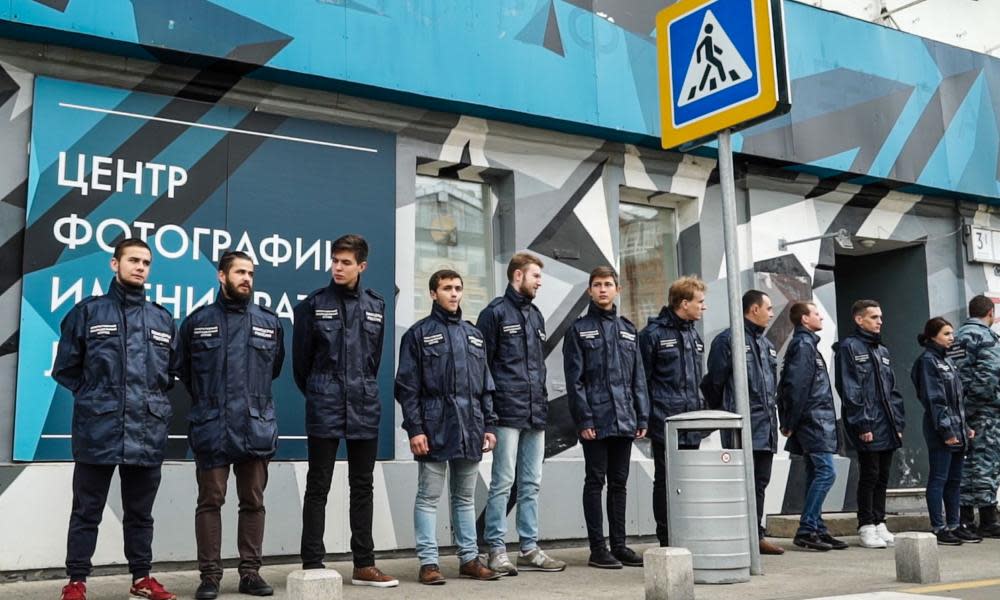The arts thrive in Putin’s Russia – though they play a complex game of censorship | Natalia Antonova

Does Russia have censorship of the arts? Ask any singer, film-maker or actor, and the answers are bound to be long-winded and contradictory. While many hear the phrase “authoritarian regime” and think of a caricature – barbed wire, barking police dogs, and artists singing hymns to the dear leader, their terror almost visible beneath their stage makeup – Vladimir Putin’s government contains more contradictions than this vision would allow for.
The Russian state’s paradoxical nature becomes especially apparent when considering the country’s thriving arts scene. It is these contradictions of governance, and their peculiar influence on the Russian art world, that aid and abet Putin’s rule, and ultimately, help generate support for the Russian president.
So is there censorship? Yes, some people would argue – but it’s not clearly defined, and nobody knows how it works. Others would hold the opposite view, while defending the principle – just look at how many artists the USSR produced, they say: so unlike the young, spoilt, soft-bodied artists of today!
A more nuanced view would be that there is censorship, but it’s mostly artists self-censoring, to avoid losing access to government funds or facilities.
In the autumn of 2016, the Russian art world was rocked by a scandal that followed a predictable pattern. An exhibition featuring the work of the American photographer Jock Sturges caused outrage. A bunch of well-organised “patriots” calling themselves Officers of Russia showed up to the gallery hosting the exhibition: one photograph was doused with urine, and the exhibition – which broke no Russian laws – was swiftly shut down.
Fast-forward a few months, and these same “patriots” are being trashed on prime time by Dmitry Kiselyov, commonly known in the west as Russia’s chief propagandist, for their “scabrous” antics.
Censorship in Russia is a game. Self-appointed “censors” see opportunities to curry favour with certain officials, if not with Putin himself, and create scandals. In turn, other, more powerful servants of the Kremlin feel free to slap them down. The Russian art world is thus subject to a clash of influences and alliances, rather than a series of rigid, systematic repressions that stem from a core, ruling ideology.
The game suits Putin’s purposes perfectly. It ensures that the Russian art world continues to thrive overall – lending prestige to the government and its leader – but equally it ensures that Russian artists and their patrons live in an unpredictable, stressful environment, where you must think twice before sticking your neck out. This is just as true for Kremlin-aligned figures on the Russian arts scene as for those who engage in conscious protest art – not to mention the multitude who occupy the huge grey area in between.
Putin’s officials draw lines in the air, rearrange them at will, and then tell you that the lines don’t exist
In the Soviet era, government drew lines in the sand and warned artists not to cross them. People mostly knew where they stood and could make conscious decisions about how far and hard to push. Putin’s officials draw lines in the air, rearrange them at will, and then tell you that the lines don’t exist, and you’re crazy for imagining them in the first place.
Putin is no Kim Jong-un: he has no interest in controlling starving peasants and grovelling automatons; he has serious ambitions on the world stage, and wants Russia to be reckoned with in all aspects of life, including the arts. This is why he will delay an organised crackdown on the arts for as long as other interests, including military ones, will allow it.
For Russian artists, this means that they are likely to be used in a variety of ways. When Andrei Zvyagintsev’s film Leviathan first came out– a chilling meditation on how Russian officials prey on their fellow citizens – Russia’s minister of culture decided to demonstrate his loyalty to the state by accusing the director of trying to cater to western audiences with his nightmarish vision of life in the country. When the film was then nominated for an Oscar, and lost, that very same culture minister immediately changed tactics, called the director a “talented artist”, and heavily implied that the Academy Awards are irrelevant anyway, so who cares if they snubbed such a great film.
Hypocritical? Sure. But accusations of hypocrisy carry little weight in a political system built for maximum expediency – and the minister of culture knows this as surely as the Russian president does.
Then there is the fact that Putin himself wants to be admired by artists. The admiration of salt-of-the-earth types is politically convenient, but it is not enough. There is a reason why Putin elevated someone like Vladislav Surkov, long thought of as the Kremlin’s “grey cardinal”, to positions of power. Surkov isn’t just a shrewd strategist and manipulator, he also built bridges between the Kremlin and the art world, protecting some and intimidating others – and speaking to artists in their own language, as opposed to tiresome Russian bureaucratese.
By the time Russia decided to annex Crimea in 2014, the hundreds of prominent Russian artists who signed an open letter “supporting the position of the president on Ukraine and Crimea” didn’t do so out of any existential fear. Likewise, I don’t think that the majority did it because they were terribly invested in what was being done to Ukraine. They were playing the part in the process that they knew the Kremlin wanted them to play.
The thing about the politics of expediency is that it works both ways: if everything the government does is just a performance to appeal to the public, then an individual’s political allegiances and beliefs can also be performative, a role in a great governmental play, to be ushered on and off stage at will. Who better to understand that than an artist?

 Yahoo News
Yahoo News 
